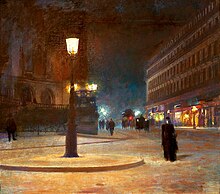Streetlight Effect

Streetlight Effect is a term common in the Anglo-Saxon-speaking area for a special form of distorted perception , in which one looks or looks for (for solutions) where the search appears easiest.
It is often traced back to an anecdote about the Mullah Nasreddin , who allegedly lost his house keys at night and did not look for them where he had probably lost them, but at the doorway, where the light was better. Corresponding caricatures have been known since the end of the 19th century. In the social sciences, this story was first taken up in 1964 by the American philosopher Abraham Kaplan under the name “the principle of the drunkard's search” . David H. Freedman then coined the term “Streetlight Effect” in the article Why Scientific Studies Are So Often Wrong: The Streetlight Effect in Discover Magazine July / August 2010.
The expression also alludes to the tendency to (incorrectly) depict aspects that are actually in the research interest and difficult to quantify with more easily accessible metrics and measurement data.
The problem is not limited to the social sciences. It also arises in medicine, for example in research on diabetes , where there is a high level of pressure to expect cures and which therefore no longer ventures into unsafe areas outside of the established methods. The effect was also assumed for antiarrhythmic drugs. Initially, the drugs were widely used in the treatment of cardiac arrhythmias , since non-medicated people with a more even heart rhythm are less prone to heart attacks. However, it had not been recognized or tested that antiarrhythmics themselves can trigger cardiac arrhythmias, and the likelihood of a heart attack increases in a third of people with artificially stabilized pulse. David Freedman also carried the concept over to the disproportionate proportion of studies that seek the public eye, in which they are presented as scientific breakthroughs. In fact, it is not only in many medical and economic studies that the proportion of failures is much greater, which is inevitably part of research. Freedman relies on an aphorism attributed to Albert Einstein. If we knew what we are doing, would it (not) be called research?
A street lamp effect is also assumed by David Victor when researching global warming . Although the IPCC is legitimized as a serious scientific institution on climate issues, it threatens to become increasingly irrelevant for politics because of its focus on established climatological knowledge. The most important controversies on climate issues take place in the social sciences.
The effect also occurs in image analysis with Bayesian statistics and can be mathematically avoided.
Individual evidence
- ^ A b c d e Why Scientific Studies Are So Often Wrong: The Streetlight Effect. In: DiscoverMagazine.com. Retrieved May 30, 2015 .
- ^ David H. Freedman : The Streetlight Effect . In: Discover magazine , August 1, 2010. Retrieved August 24, 2010.
- ^ A b David H. Freedman : Wrong: Why Experts Keep Failing Us . Little, Brown and Company, 2010, ISBN 0-316-02378-7 .
- ↑ Sufism / Nasrudin in the English-language Wikibooks
- ↑ a b "Did You Lose the Keys Here?" "No, But the Light Is Much Better Here". In: Quote Investigator. 2013, accessed May 30, 2015 .
- ^ Abraham Kaplan : The conduct of inquiry . Transaction Publishers, 1973, ISBN 978-1-4128-3629-6 ( books.google.com [accessed May 30, 2015]).
- ↑ Jim Jansen: Understanding Sponsored Search: Core Elements of Keyword Advertising, Cambridge University Press 2011
- ^ The Streetlight Effect in Type 1 . In: Diabetes . tape 64 , no. 4 , April 2015, ISSN 0012-1797 , p. 1081-1090 , doi : 10.2337 / db14-1208 , PMID 25805758 ( online [accessed May 30, 2015]).
- ↑ David G. Victor : Climate change: Embed the social sciences in climate policy . In: Nature . tape 520 , 2015, p. 27-29 , doi : 10.1038 / 520027a .
- ↑ Avoiding the "streetlight effect": tracking by exploring likelihood modes . In: Tenth IEEE International Conference on Computer Vision, 2005. ICCV 2005 . tape 1 , October 2005, p. 357–364 Vol. 1 , doi : 10.1109 / ICCV.2005.41 ( online [accessed May 30, 2015]).